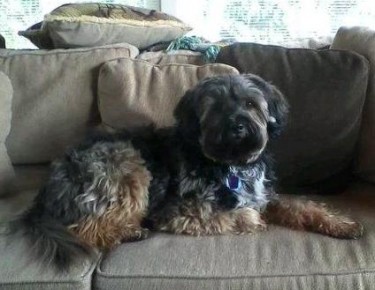Dog Shadow
by Kira Goldenberg

Toward the end of my breast cancer treatment, I couldn’t do much besides sleep. “An exhaustion like nobody knows,” the kind receptionist outside the radiation oncology department called it. Along with painful burns (and the fact that all the other 26-year-olds I knew were off living instead of trekking to the hospital daily), the regimen’s side effects could have made the last four months of 2011 an isolating experience. But I was never alone, because my dog, Kip, refused to let me leave his sight. My ‘dog shadow’ followed me from room to room, wedging his back beside my thigh wherever I settled. This from a dog who normally spent his time hiding in the little-used living room, prefering to nap undisturbed.
About a year post-treatment, I’m a card-carrying resident of Cancerland. Barbara Ehrenreich derided it as a place where “the appropriate attitude is upbeat and even eagerly acquisitive.” But if you avoid the pink-ribbon mean girls and cluster in the corner with the loudmouthed misfits, it’s more a scrubby, desert hinterland, where dark humor abides and medical jargon is colloquial. Well-meaning outsiders approach the border reluctantly — There but for the Grace of God go I — and tell me about diagnoses of women I only vaguely know, new Cancerland dwellers. But if they don’t know the answers to my follow-up questions about tumor biology, I just smile and nod and turn the conversation to something lighter, like Kippy. He’s been my go-to anecdote source for the last 13 years, when I’m not relating the newest sex-related quip from my 90-year-old grandfather or tales of my boss’s ring-necked dove, who sleeps — and shits — on his very own crystal bowl in his very own bathroom.
When my family first met Kippy 13 years ago, we didn’t want him. He was part of a litter of Tibetan terriers, and we had our pick. I was in love with a little black lady. My mom was starry-eyed for the litter’s chunky alpha puppy. Nobody noticed the brown guy in the corner. But he picked us, toddling over to my brother and making it clear that, when we left, he’d be coming too. I held him on my lap for the long car ride home, and he cried the entire way.
Since then, I graduated from high school, then college, then filtered restlessly through a host of jobs throughout the northeast. Kippy grew from mousy to 35 furry pounds, with a noble white chest, a black snout, a rich chocolate back, and a tail that, when he walks, looks like a swishing flag. And he matured into a position of royalty. When Mom bought a new couch for the family room, she was careful to pick one whose armrests worked with Kip’s fondness for perching his head atop them. He gets eight nights of Chanukah gifts every year, and when he doesn’t feel like eating kibble, someone either coaxes him by hand, bite by bite, or fries him an egg. My dad lets Kip decide where they’ll walk when they go outside together, and Kip often leads Dad toward the homes of various friends who store treats for him, which means that he has to lie to the dog and tell him that Jill and Tina aren’t home when Kip tries to visit them at 6 a.m.
I’d accompany these stories with iPhone photos of his adorable glare — he’s so cute, you don’t even know. The stories no longer naturally lighten the mood, though, because we recently found out that Kippy has an aggressive melanoma that will likely kill him within the next few months. I was visiting when he had the primary tumor — a dime-sized, gelatinous lump — removed from his eyelid. The vet cut off a sliver of eyelid and sutured the remaining bits together, attempting clear margins before we learned that Kip’s cancer cells divide so fast it’s inevitable that it’s already spread.
When we went to pick Kippy up from his surgery, in a tapering snowstorm, he was disoriented, indignant. Unlike when I opted for my lumpectomy and signed all the permissions and releases, Kippy had no say in the fact that he was suddenly in pain, wearing that barbaric lampshade collar to keep him from pawing the stitches. We took him home, and then he and I dozed off together in my childhood bed, just like when I was the one in treatment.
In the past year and a half, I’ve learned that I can deal with cancer and its treatment, but Kippy’s sickness marks my limit. I’ve heard that women who want children see babies everywhere; in my mind, everyone in New York City is walking a dog. I wrote a personal blog post titled “I hate everything,” burrowed into a comforter, and cried for days, emerging to eat cupcakes and refresh my tissue supply.
This is not how denizens of Cancerland are supposed to react to a diagnosis. To quote Ehrenreich again, “cheerfulness is required, dissent a kind of treason.” She was describing, specifically, the rah-rah nature of pink-ribbon culture, which elevates optimism in a way that suggests those who didn’t “win the battle” with cancer died because they weren’t chipper enough.
Bullocks to that. My dog is optimistic about life in a manner only possible for one who always gets his way. Nobody in my family has eaten a fortune cookie for the past decade, because he loves them. His life is an unending chain of knowing things will turn out exactly as he wishes.
Still, his cancer is going to kill him, and it will happen soon. I don’t know what I’ll do then, but I’m glad that, as I welcome him to the neighborhood, I know he won’t have to be here for long.
Kira Goldenberg is an associate editor at the Columbia Journalism Review.